|
|
|
Sort Order |
|
|
|
Items / Page
|
|
|
|
|
|
|
| Srl | Item |
| 1 |
ID:
182149
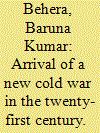

|
|
|
|
|
| Summary/Abstract |
The saying ‘History repeats itself ’ seems to be validated in the present scenario of international politics. The memory of the Cold War era is being resurrected in this twenty-first century. All these things become more visible in this pandemic period with clear-cut fault lines drawn between the USA (the surviving superpower) and China (the emerging superpower). The suspicion about the role of China in spreading the Wuhan Virus (COVID-19) has brought closer the prospect of the new cold war. Recent belligerent attitudes of China support this assessment. Cold war power politics will resurface with Asia as the focal point. The concept of Bi-polarity is taking shape again in world politics. Structures such as the D-10, G-7 extension, Quad grouping and Five Eyes networking bolster the bi-polarity. Against this background, Baruna Kumar Behera seeks to examine international politics in this century.
|
|
|
|
|
|
|
|
|
|
|
|
|
|
|
|
| 2 |
ID:
188895
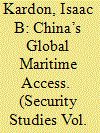

|
|
|
|
|
| Summary/Abstract |
China lacks the network of foreign military bases that typically attends great-power expansion, yet its armed forces operate at an increasingly global scale. How has the People’s Liberation Army (PLA) managed this feat without a significant footprint on foreign soil? Why has Chinese leadership not (yet) established a network of bases to address security threats to China’s overseas interests? This article analyzes the structural constraints facing China’s military basing abroad and then examines the methods by which the PLA has nonetheless achieved significant global power-projection capability. It highlights the capacity provided by international maritime transport infrastructure owned and operated by Chinese firms as a viable—yet limited—means of securing national interests overseas with military power. The study demonstrates that the structural setting and historical sequence of China’s rise render foreign military bases relatively costly, incentivizing alternative modes of access and power projection in the maritime domain.
|
|
|
|
|
|
|
|
|
|
|
|
|
|
|
|
| 3 |
ID:
046456
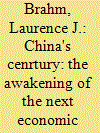

|
|
|
|
|
| Publication |
Singapore, John Wiley & Sons, 2001.
|
| Description |
xvii,421p.
|
| Standard Number |
0471479012
|
|
|
|
|
|
|
|
|
|
|
|
Copies: C:1/I:0,R:0,Q:0
Circulation
| Accession# | Call# | Current Location | Status | Policy | Location |
| 045309 | 338.951/BRA 045309 | Main | On Shelf | General | |
|
|
|
|
| 4 |
ID:
156948
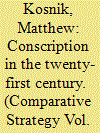

|
|
|
|
|
| Summary/Abstract |
In the years following the Cold War, European states scrambled to downsize and reorganize their militaries to reflect the new geopolitical environment. As a part of this transformation, virtually every NATO member suspended or phased out conscription. This article discusses the strategic rationale behind Germany's decision to end conscription while comparing it with Norway's decision to enhance the draft. In recent years, Norway has refined its defense strategy and shifted its focus away from territorial defense. Nevertheless, territorial defense remains a priority in Norwegian defense policy and conscription enables Norway to expand its territorial presence, maintain a total defense doctrine, and guarantee a stable level of military manpower.
|
|
|
|
|
|
|
|
|
|
|
|
|
|
|
|
| 5 |
ID:
151415
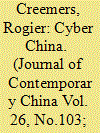

|
|
|
|
|
| Summary/Abstract |
The first two years of the Xi Jinping administration saw a thorough reconfiguration of Internet governance. This reconfiguration created a centralized and integrated institutional framework for information technologies, in support of an ambitious agenda to place digital technologies at the heart of propaganda, public opinion and social control work. Conversely, the autonomy and spontaneity of China’s online sphere was vastly reduced, as the leadership closed channels for public deliberation. This article reviews the institutional and regulatory changes that have taken place between 2012 and 2014, and analyses the methods and purposes of control they imply.
|
|
|
|
|
|
|
|
|
|
|
|
|
|
|
|
| 6 |
ID:
184506
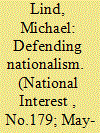

|
|
|
|
|
| Summary/Abstract |
THE TWENTY-FIRST century is the era of the nation-state. Today there are 193 members of the United Nations General Assembly, even though at the time of its formation, the UN had only fifty-one members. Where did those 142 members come from, in the last seventy-seven years? The new states were formed from the partition of former European empires like the British and French Empires, the disintegration of the Soviet Union, which was the successor state to the Romanov Russian Empire, and in some cases, like those of Yugoslavia and Sudan, the disintegration of post-colonial successor states into even smaller states.
|
|
|
|
|
|
|
|
|
|
|
|
|
|
|
|
| 7 |
ID:
154958
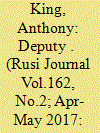

|
|
|
|
|
| Summary/Abstract |
The British Army has traditionally been sceptical about the role of deputy commanders. However, on recent operations, deputy commanders have played an increasingly important executive role. In this article, Anthony King examines why they have become more important and analyses the deep cultural reasons that explain why – even today – the British Army has been slow to embrace the concept of the deputy commander.
|
|
|
|
|
|
|
|
|
|
|
|
|
|
|
|
| 8 |
ID:
180404
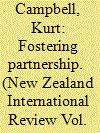

|
|
|
|
|
| Summary/Abstract |
The Pacific will be the dominant international arena in the 21st century. The United States' goal in dealing with an increasingly complex region will be to preserve the operating system that has allowed massive development in the region over the last five decades. It is a region that faces major challenges and its response will be critical to dealing effectively with the existential threat posed by climate change and other transnational threats. Before addressing these problems, the Biden administration is focused initial on domestic concerns, restoring the economy and healing divisions, but it values bilateral relations with likeminded states like New Zealand.
|
|
|
|
|
|
|
|
|
|
|
|
|
|
|
|
| 9 |
ID:
158359
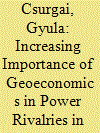

|
|
|
|
|
| Summary/Abstract |
Relations between states in the post-Cold War period have been shaped by an increased economic competition including ‘non-market’ factors such as intelligence sharing between state agencies and private businesses, successful economic diplomacy and different techniques to influence and manipulate non-governmental organisations to weaken an economic adversary, among other things. The considerable influence of these non-market factors illustrates the limits of the liberal economic theories that emphasise the dominant role of market forces. Geoeconomics is an interdisciplinary analysis that includes geopolitical factors, economic intelligence, strategic analysis and foresight and has the objective to provide a tool for states and businesses to develop and implement successful strategies to conquer markets, and protect strategic segments of the domestic economy, among other things. This article argues about the growing significance of geoeconomics in contemporary power rivalries, presents some strategic aspects of the role of state in the establishment and coordination of a national geoeconomic disposition, and highlights briefly the importance of the strategic management of information to support geoeconomic strategies. Some arguments of the article ‘Geoeconomic Analysis and the Limits of Critical Geopolitics: A New Engagement with Edward Luttwak’ are briefly discussed as well.
|
|
|
|
|
|
|
|
|
|
|
|
|
|
|
|
| 10 |
ID:
167119
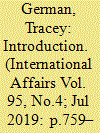

|
|
|
|
|
| Summary/Abstract |
Russia's actions in Ukraine, the rise (and apparent fall) of Islamic State in Syria and northern Iraq, and Chinese activity in the South China Sea have kindled renewed debate about the character of war and conflict, and whether it is undergoing a fundamental shift. Such reflections and assertions about the apparent transformation of conflict are not new; one of the enduring features of conflict over the centuries has been its state of flux. What is new is the pace of such change, accelerated by the ongoing technological and communications revolution. Individuals can now communicate and engage with one another across state boundaries to an unprecedented extent and in new ways, adding to the complexity of the international environment. The debate about whether the character of conflict is changing is not a purely philosophical pursuit: it has real-world implications, for how states envision the character of conflict shapes how they plan and prepare for war, from defence policy to procurement and from doctrine to training. Thus, it is imperative to consider the types of conflict in which states perceive themselves to be, or risk becoming, involved. That is what this special issue of International Affairs sets out to do, exploring how different states plan for and predict the future character of war and conflict, how the experiences of individual states foster different visions of future conflict and how states envisage military force being used, either by themselves or by potential adversaries.
|
|
|
|
|
|
|
|
|
|
|
|
|
|
|
|
| 11 |
ID:
095607
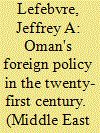

|
|
|
| 12 |
ID:
173662
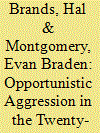

|
|
|
|
|
| Summary/Abstract |
Policymakers should not fool themselves into thinking that there are easy, lowcost alternatives to keeping the threat of opportunistic aggression at bay.
|
|
|
|
|
|
|
|
|
|
|
|
|
|
|
|
| 13 |
ID:
141306
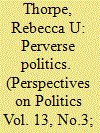

|
|
|
|
|
| Summary/Abstract |
I examine the political consequences of prison development in the United States. I theorize that the prison apparatus not only upholds a system of racial hierarchy and class stratification, but also links the economic stability of lower-class, rural whites to the continued penal confinement of poor, urban minorities. Analysis of an original dataset suggests that local reliance on existing prison infrastructure throughout many economically-depressed rural communities strengthens political support for harsh criminal punishments and militates against reform efforts. Political representatives have powerful interests in protecting rural prison investments, regardless of their actual economic impact in host communities. The evidence indicates that rural prison development contributes to the perceived economic viability and political power of rural areas, while reinforcing forms of punishment that destabilize poor urban neighborhoods and harm politically marginalized populations.
|
|
|
|
|
|
|
|
|
|
|
|
|
|
|
|
| 14 |
ID:
184956
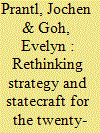

|
|
|
|
|
| Summary/Abstract |
Today's most pressing security and policy challenges—great power conflict, economic interdependence, peacebuilding, climate change and other non-traditional threats such as pandemics—are all complex problems. Hyperconnectivity, power diffusion and radical technological transformation are significantly shrinking the policy space available to governments and other international agencies in what has been called the twenty-first century of complexity. Thus, the practice of statecraft requires accentuated strategic rationale: clear emphasis on big-picture and longer-term purposes and priorities. While effective strategy is essential for mobilizing power and winning strategic contests, effective diplomacy is necessary for garnering support for the strategy. This article contributes to stepping up to this challenge in three innovative ways. First, it utilizes key insights from complex adaptive systems thinking to recast the conceptual underpinnings of power, strategy and statecraft. Second, the article advances a ‘strategic diplomacy’ diagnostic and policy framework to maximize policy space in dealing with complex systems problems in international affairs. And third, by applying the framework to three significant international policy challenges, the article demonstrates the utility and implications of the ‘strategic diplomacy’ framework for strategic policy in the twenty-first century.
|
|
|
|
|
|
|
|
|
|
|
|
|
|
|
|
| 15 |
ID:
143221
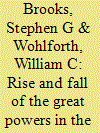

|
|
|
|
|
| Summary/Abstract |
Unipolarity is arguably the most popular concept used to analyze the U.S. global position that emerged in 1991, but the concept is totally inadequate for assessing how that position has changed in the years since. A new framework that avoids unipolarity's conceptual pitfalls and provides a systematic approach to measuring how the distribution of capabilities is changing in twenty-first-century global politics demonstrates that the United States will long remain the only state with the capability to be a superpower. In addition, China is in a class by itself, one that the unipolarity concept cannot explain. To assess the speed with which China's rise might transform this into something other than a one-superpower system, analogies from past power transitions are misleading. Unlike past rising powers, China is at a much lower technological level than the leading state, and the gap separating Chinese and U.S. military capabilities is much larger than it was in the past. In addition, the very nature of power has changed: the greatly enhanced difficulty of converting economic capacity into military capacity makes the transition from a great power to a superpower much harder now than it was in the past. Still, China's rise is real and change is afoot.
|
|
|
|
|
|
|
|
|
|
|
|
|
|
|
|
| 16 |
ID:
130272
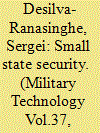

|
|
|
|
|
| Publication |
2013.
|
| Summary/Abstract |
The small oil rich nation of Brunei is situated in the Southeast Asian archipelago on the island of Borneo's northwest and is the last absolute monarchy in the Asia Pacific. Since the attainment of independence from Britain, Brunei has remained an economically prosperous and politically stable nation that has built a credible mil-itary capability to safeguard itself from emerging geopolitical and transnational threats.
|
|
|
|
|
|
|
|
|
|
|
|
|
|
|
|
| 17 |
ID:
182879
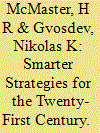

|
|
|
| 18 |
ID:
076339
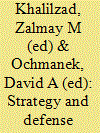

|
|
|
|
|
| Publication |
Santa Monica, Rand Corporation, 1997.
|
| Description |
xviii, 351p.
|
| Standard Number |
0833024566
|
|
|
|
|
|
|
|
|
|
|
|
Copies: C:1/I:0,R:0,Q:0
Circulation
| Accession# | Call# | Current Location | Status | Policy | Location |
| 038956 | 355.033073/KHA 038956 | Main | On Shelf | General | |
|
|
|
|
| 19 |
ID:
155220
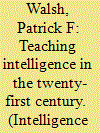

|
|
|
|
|
| Summary/Abstract |
Since 9/11, the ‘Five Eyes’ countries have seen a dramatic rise in intelligence training and education courses across the national security and law enforcement contexts. However, there remains little publicly available empirical evidence to demonstrate specifically where improvements have been made to workplace practices and processes as a result of this investment. This article, argues that the education sector in the intelligence discipline lacks an evaluation research agenda, for validating the workplace effectiveness of training and education programs. Further, a first step in understanding whether curriculum are ‘fit for purpose’ may be articulating some underlying common normative principles for evaluating programs in any intelligence context.
|
|
|
|
|
|
|
|
|
|
|
|
|
|
|
|
| 20 |
ID:
144047
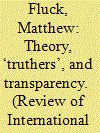

|
|
|
|
|
| Summary/Abstract |
The current era is often described in epistemic terms, as an ‘information age’ or ‘knowledge society’. Such claims reflect ideals that are deeply ingrained in modern societies. There is a widespread assumption that successful social and political interaction involves access to information and that political power is gained when knowledge replaces obscurity. Such assumptions reflect contemporary ‘epistemic folkways’, which are manifested in two widespread epistemic phenomena – faith in ‘transparency’ and conspiracy theorising
International Relations (IR) theorists should be well-equipped to understand such developments. However, reflection concerning epistemic matters in IR is in under attack, increasingly presented as a distraction from the formulation of empirically grounded accounts of international politics. This article argues that reflexive theory can in fact play an important role in helping IR scholars to understand contemporary epistemic folkways. Drawing on the Critical Theory of Theodor Adorno, it is argued that the transparency ideal and conspiracy theorising reflect the efforts of individuals to increase their influence in a world in which they are both objects of technical knowledge and, in principle, epistemically empowered subjects. Reflection on the subject-object relationship suggests that the pursuit of increasingly unmediated access to information is in fact a key source of reification and disempowerment.
|
|
|
|
|
|
|
|
|
|
|
|
|
|
|
|
|
|
|
|
|